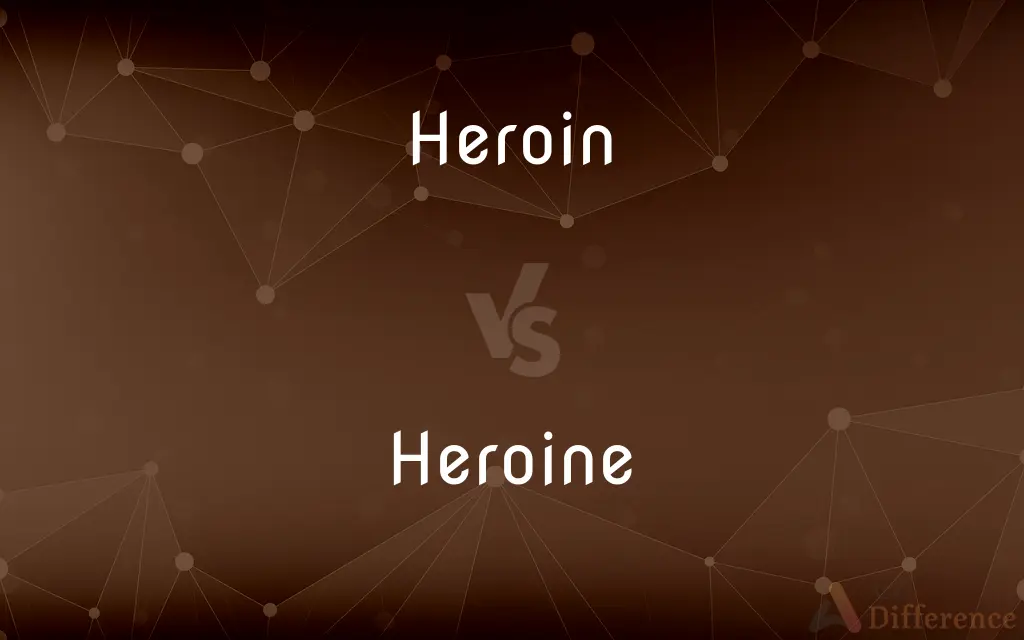Heroin vs. Heroine — What's the Difference?
Edited by Tayyaba Rehman — By Maham Liaqat — Updated on March 20, 2024
Heroin is a highly addictive drug derived from morphine, whereas a heroine is a female hero known for courage or noble qualities.

Difference Between Heroin and Heroine
Table of Contents
ADVERTISEMENT
Key Differences
Heroin, an opioid drug synthesized from morphine, is known for its potent addictive properties and is often associated with serious health and societal issues. A heroine, on the other hand, refers to a female character or figure who displays courage, bravery, or noble qualities in literature, movies, or real life.
While heroin has a predominantly negative connotation due to its association with addiction and health crises, the concept of a heroine is celebrated and positive, highlighting the strength and resilience of women. These distinct terms underscore the importance of context and pronunciation in understanding and conveying meaning accurately.
The distinction is not just in their meanings but also in their impact on society. Heroin, as a substance, poses a significant challenge to public health, law enforcement, and social services, contributing to the complexity of drug abuse and addiction issues worldwide. Heroines, however, inspire through their stories, whether fictional or real, encouraging others with their examples of courage, perseverance, and integrity.
Understanding the difference between heroin and heroine is crucial not only for accurate communication but also for appreciating the broader implications each term carries within societal and cultural contexts.
Comparison Chart
Definition
A highly addictive opioid drug derived from morphine.
A female hero; a woman admired for her courage or noble qualities.
ADVERTISEMENT
Connotation
Negative, associated with addiction and health risks.
Positive, associated with bravery and inspiration.
Usage
Used recreationally for euphoric effects; illegal in most countries.
Used to describe female characters or real-life figures in stories or history.
Implications
Health crises, addiction, law enforcement challenges.
Empowerment, inspiration, role models in literature and real life.
Pronunciation
/ˈhɛroʊɪn/
/ˈhɛroʊˌɪn/
Compare with Definitions
Heroin
Derived from morphine, often used illicitly.
Police confiscated a large quantity of heroin during the raid.
Heroine
Often the main character in a literary work.
The heroine's journey was central to the book's plot.
Heroin
Known for causing severe physical and psychological dependence.
Heroin addiction is difficult to overcome without professional help.
Heroine
A real-life woman admired for her bravery or achievements.
She was celebrated as a heroine for her work in disaster relief.
Heroin
Associated with a high risk of overdose.
The community is mourning a young life lost to a heroin overdose.
Heroine
Can be a role model for others.
Young girls look up to her as a heroine for her athletic accomplishments.
Heroin
Can be injected, snorted, or smoked.
Outreach programs aim to educate about the risks of sharing needles for heroin use.
Heroine
Symbolizes female strength and empowerment.
The film featured a heroine who challenged societal norms.
Heroin
A narcotic drug that is highly addictive.
Heroin use has led to a public health crisis in many cities.
Heroine
A female character who displays courage in a story.
The novel's heroine overcame great obstacles.
Heroin
Heroin, also known as diacetylmorphine and diamorphine among other names, is an opioid used as a recreational drug for its euphoric effects. Medical grade diamorphine is used as a pure hydrochloride salt which is distinguished from black tar heroin, a variable admixture of morphine derivatives—predominantly 6-MAM (6-monoacetylmorphine), which is the result of crude acetylation during clandestine production of street heroin.
Heroine
A woman noted for courage and daring action.
Heroin
A highly addictive analgesic drug derived from morphine, often used illicitly as a narcotic producing euphoria.
Heroine
A woman noted for special achievement in a particular field.
Heroin
A white, odorless, bitter crystalline compound, C21H23NO5, that is derived from morphine and is a highly addictive illegal narcotic. Also called diacetylmorphine.
Heroine
The principal female character in a novel, poem, or dramatic presentation.
Heroin
A powerful and addictive drug derived from opium producing intense euphoria. Classed as an illegal narcotic in most of the world.
Heroine
A female hero.
Heroin
A morphine derivative, diacetyl morphine, used to relieve severe pain and as a sedative. It is highly addictive, and its use is strictly controlled in the U.S. by federal law. It is a popular strong narcotic drug of abuse, in part because it is more soluble than morphine. It is sometimes included as one of the components of Brompton's mixture, used to control pain in terminallly ill patients.
Heroine
A female lead character.
Heroin
A narcotic that is considered a hard drug; a highly addictive morphine derivative; intravenous injection provides the fastest and most intense rush
Heroine
A woman of an heroic spirit.
The heroine assumed the woman's place.
Heroine
The principal female person who figures in a remarkable action, or as the subject of a poem or story.
Heroine
The main good female character in a work of fiction
Heroine
A woman possessing heroic qualities or a woman who has performed heroic deeds
Common Curiosities
Is it possible for a real person to be a heroine?
Yes, real women who are admired for their bravery, achievements, or noble qualities can be considered heroines.
Can a man be a heroine?
No, a man would be referred to as a hero. The term "heroine" is specifically used for females.
What are the risks of using heroin?
Risks include addiction, overdose, infectious diseases from needle sharing, and other health complications.
How can heroines influence society?
Heroines can inspire both women and men with their courage, resilience, and achievements, promoting gender equality and empowerment.
Can a heroine have flaws?
Yes, heroines, like all characters, can have flaws, making them more relatable and their stories more compelling.
Can heroines be found in all genres of literature and film?
Yes, heroines appear in all genres, from historical narratives to science fiction and fantasy.
What impact does heroin have on communities?
Heroin can lead to increased crime, health crises, and economic burdens on communities and healthcare systems.
How do heroines contribute to feminist narratives?
Heroines challenge traditional gender roles and stereotypes, contributing to feminist narratives by showcasing female agency and complexity.
What is heroin made from?
Heroin is made from morphine, a substance derived from the opium poppy plant.
What's the difference in impact between heroin and heroines on youth?
Heroin poses significant health risks to youth, while heroines can serve as positive role models, inspiring courage and resilience.
Are there any successful treatments for heroin addiction?
Yes, there are various treatments, including medication-assisted therapy, counseling, and support groups.
Can literature and film help in combating heroin addiction?
While they can raise awareness and promote empathy, combating addiction also requires comprehensive public health and community efforts.
How are new heroines being created in modern media?
Modern media creates heroines by diversifying their backgrounds, challenges, and achievements, reflecting broader societal changes and inclusion.
How do you pronounce "heroin" and "heroine"?
"Heroin" is pronounced /ˈhɛroʊɪn/, and "heroine" is pronounced /ˈhɛroʊˌɪn/.
Is heroin legal anywhere?
While heroin is illegal in most countries, some have harm reduction policies that include supervised use sites or prescription programs under medical supervision.
Share Your Discovery

Previous Comparison
Eatable vs. Edible
Next Comparison
Coal vs. CharcoalAuthor Spotlight
Written by
Maham LiaqatEdited by
Tayyaba RehmanTayyaba Rehman is a distinguished writer, currently serving as a primary contributor to askdifference.com. As a researcher in semantics and etymology, Tayyaba's passion for the complexity of languages and their distinctions has found a perfect home on the platform. Tayyaba delves into the intricacies of language, distinguishing between commonly confused words and phrases, thereby providing clarity for readers worldwide.














































